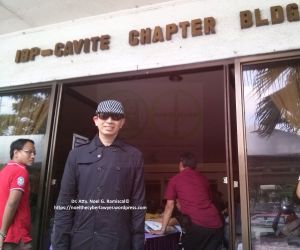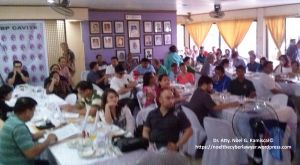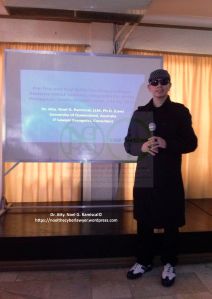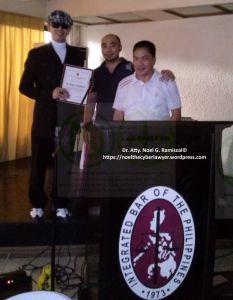Dr. Atty. Noel G. Ramiscal was fortunate enough to be invited to give two Mandatory Continuing Legal Education (MCLE) lectures for the Integrated Bar of the Philippine (IBP) Cavite Chapter, organized by the IBP National Office last July 31, 2015. As was his practice, he travelled from the province of Laguna to the conference site quite early to avoid being late, but the conditions are quite unpredictable and there was a road incident that caused a lot of bottleneck. Fortunately, the driver of the van that ferried Dr. Ramiscal was knowledgeable of all the side streets and interconnecting pathways of the variegated terrain of this prosperous province.
The IBP Cavite Chapter owned its building which was located in the Cavite Civic Center Compound that also houses some of the courts and a penitentiary.
It was a quaint building overflowing with lawyers. The members in this chapter exceed 1,000 and they were expecting about 39 new lawyers to join. On the day slated for the lectures an electrical wire exploded taking down the airconditioning system. It was fixed for a while and then it broke down again. It is a testament to the commitment of the lawyers to their professional development that they stayed on for the entire day up to the early hours of the evening enduring the hot and humid conditions inside and outside the building.In his lecture on handling e-data,
Dr. Ramiscal canvassed and discussed the relevant Philippine laws, rules, and jurisprudence on the discovery of e-data, and concluded that there is no current legal or formal mechanism for the formal discovery of e-data in the Philippines, that could be followed in Philippine courts. He gave the audience a brief outline of the discovery processes and the legal issues connected with the discovery of e-data in the U.S.A. He also acquainted the audience of the possible penalties that may arise for any producing party of e-data that failed to put a “litigation hold” or completely observed a “preservation order” of e-data and their repositories. In his lecture on social media e-discovery, Dr. Ramiscal tackled among other things, the nature of social media data, and the fact that privacy concerns should not be mistaken, or be made an excuse for the exclusion of “private” social media data from discovery.One significant matter Dr. Ramiscal brought to the attention of the attendees was the application of the Philippine Supreme Court of the Rules on Electronic Evidence to criminal cases.
The Rules which the Supreme Court promulgated in 2001 did not cover criminal cases. To correct this oversight, the Supreme Court issued Administrative Matter No. 01-7-01-SC, Re: Expansion of the Coverage of the Rules on Electronic Evidence, last September 24, 2002.
In the April 10, 2010 case of Rustan Ang y Pascua v. the Court of Appeals, the accused claimed that the damning electronic picture which was attributed to him should have been authenticated via the means of e-signature under the expanded coverage of the aforementioned rules. Unfortunately, and inexplicably, the Second Division of the Supreme Court held that “the rules he cites do not apply to the present criminal action. The Rules on Electronic Evidence applies only to civil actions, quasi-judicial proceedings, and administrative proceedings”.
Then in March 10, 2014, the Third Division of the Supreme Court, ruled in People of the Philippines v. Enojas y Hingpit et al, that the Rules of Electronic Evidence do apply to criminal cases as a result of the 2002 Supreme Court issuance of the amendment.
It is curious to note that the “ponente” or the one who wrote the decisions in the 2010 Rustan Ang case and the 2014 Enojas case was the same Associate Justice.
During the time the erroneous Rustan Ang case served as the authority on the non-applicability of the rules to criminal cases, it caused a great ripple concerning the substantial limitations to evidentiary rights and objections the accused can raise in criminal cases involving electronic data.
The Philippine Civil Code provided that the decisions of the Supreme Court form part of the law of the land. So it would appear that the Rustan Ang decision would trump a mere 2002 administrative amendment done by the Supreme Court which this decision did not recognize.
Prior to the 2014 Enojas case, everytime Dr. Ramiscal would discuss the Rustan Ang case and its implications in MCLE lectures, he would answer lawyers who asked him if they can still use the rules of electronic evidence in criminal cases, in the affirmative. He had stated that they can do this in two ways. One, they can argue that said rules can provide some guidelines. Or second, they can place it as an issue in the criminal case itself, because there was no en banc decision, and no rule revoking the 2002 amendment. But the situation for criminal defense lawyers and their clients during this time due to the Rustan Ang case was far from ideal.
At the end, Dr. Ramiscal expressed his heartfelt appreciation for the IBP Cavite lawyers who stayed for the duration of his lectures, despite the humidity challenge, and for their sincere generosity and hospitality [Attys. Luna, Espiritu, Clorina, Yu and Anarna], and in particular to Atty. Lara (the tahong chips are superb!) and her assistant, Hazel. Kudos to the officers and members of this Chapter!







